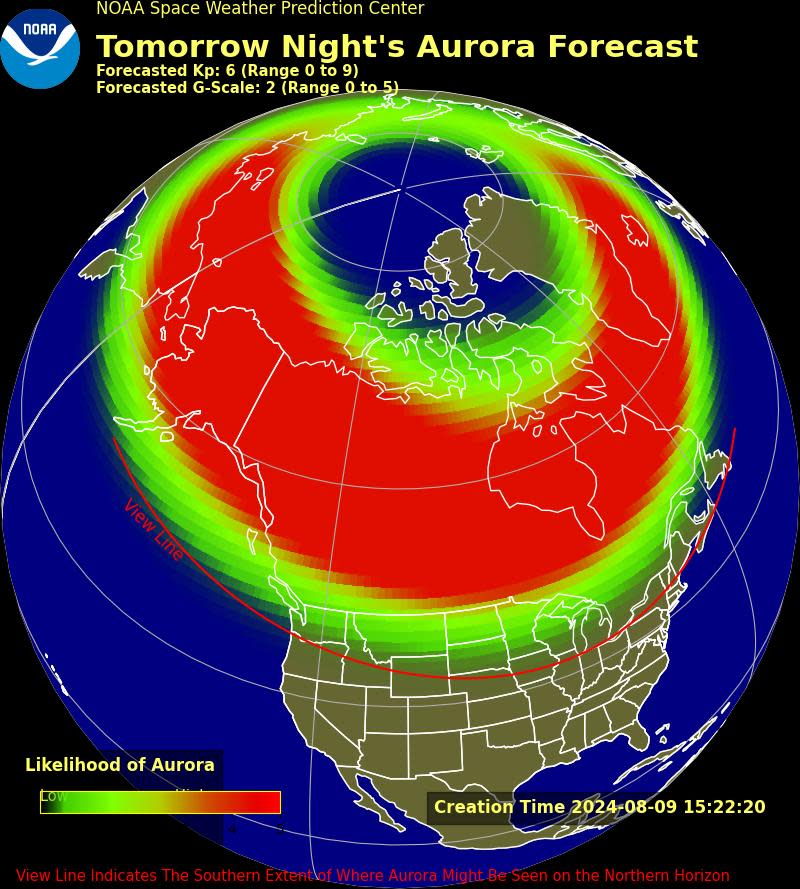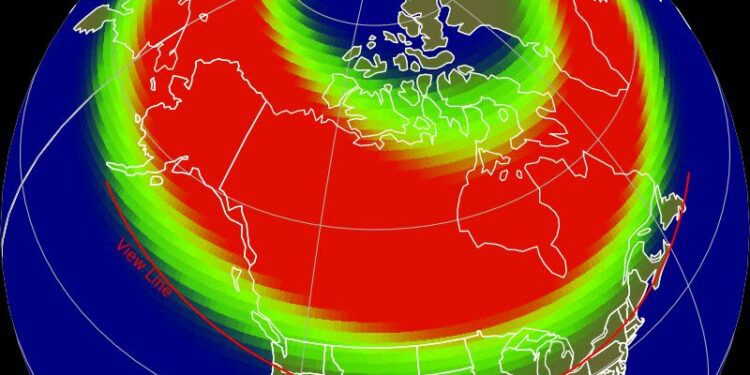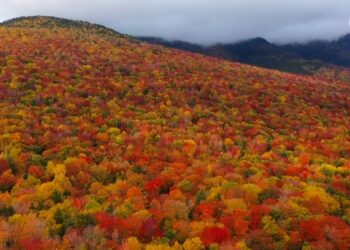Full moons. Planetary alignments. Total solar – and lunar – eclipses. Quadrantid meteor showers. Perseid meteor showers. Lyrid meteor showers. Aquariid meteor showers. Ancient comets. The Northern Lights.
Is there anything we haven’t seen this summer on a celestial level?
But there is something we haven’t seen yet in 2024, and that’s two of those space phenomena happening at almost the same time.
It’s possible that New Hampshire residents will be able to both watch the Perseid meteor shower at it’s peak this weekend and see the aurora borealis, the famous display better known as the northern lights this weekend.
When will there be a possibility of seeing the Northern Lights?

A graphic from NOAA illustrating the chances of seeing the Northern Lights tomorrow, the night of Aug. 10. At the same time, stargazers could possibly spot the ongoing Perseid meteor shower.
A Friday forecast from the National Oceanic and Atmospheric Administration predicts that solar activity could reach high enough levels to make the auroras visible in certain regions of the United States. The spectacle is most likely to be visible in “some northern and upper midwest states from Idaho to New York” the forecast says. However, the visibility line does dip into the northernmost parts of New Hampshire and Vermont.
The G2 Storm Watch, which is considered moderate viewing conditions, is in effect from August 9 to August 11.
The best chance for seeing them is expected to come late Friday night into Saturday morning, but there is a smaller chance of seeing them late Saturday into Sunday.
When is the peak of the ongoing Perseid meteor shower?
The Perseid meteor shower is reaching its crescendo.
The peak is Sunday, Aug, 11 through Monday, Aug. 12, according to Space.com, but all weekend will be good viewing. The meteor shower can be spotted through Sept. 1, when it is slated to stop.
What are Perseids?
Tim Brothers, technical instructor and observatory manager at the Massachusetts Institute of Technology told the USA Today Network last year that Perseids are a type of meteors that can be seen each year around the same time.
“The Perseids originate from Comet 109P/Swift-Tuttle,” Brothers said in the past interview. “As it has made several passes through the inner solar system, the comet has left small particles behind. As the Earth orbits, it passes through that debris cloud and those particles burn up in the atmosphere.”
According to NASA, Comet Swift-Tuttle was discovered in 1862 independently by both Lewis Swift and Horace Tuttle.
“(It) takes 133 years to orbit the sun once,” NASA noted on its website. “Swift-Tuttle last reached perihelion (closest approach to the Sun) in 1992 and will return again in 2125.”
What causes the Northern Lights?
Northern lights are caused by the sun.
“The northern lights are created when energized particles from the sun slam into Earth’s upper atmosphere at speeds of up to 45 million mph, but our planet’s magnetic field protects us from energetic assault,” according to Space.com. “As Earth’s magnetic field redirects the particles toward the poles the dramatic process transforms into a cinematic atmospheric phenomenon that dazzles and fascinates scientists and sky-watchers alike.”
Brothers explained in a past interview “it’s the ejection of material from the sun that causes this reaction.” Brothers added those are called coronal mass ejections (CME’s).
How to watch the Perseids and Northern Lights
As always, dark skies make for better stargazing.
“We typically suggest getting away from cities and find a open field or hilltop to lay out under the stars and wait for the show to really peak at the late evening or early morning hours,” Brothers said in a past interview with Wicked Local. “In New England, heading for a local conservation area or park that keeps lighting off at night is ideal. Another option is a coastline away from the larger cities — the benefit being that the constellation where you will see most of the ‘shooting stars.'”
In New Hampshire, the White Mountains are often recommended as a place to find dark skies.
USA Today contributed to this report.
This article originally appeared on wickedlocal.com: Northern lights forecast: Auroras may be visible in NH this weekend
Source link : http://www.bing.com/news/apiclick.aspx?ref=FexRss&aid=&tid=66b70d1e11324112b7cf1b221a95e8bb&url=https%3A%2F%2Fwww.yahoo.com%2Fnews%2Fparts-hampshire-may-see-northern-210132396.html&c=8730649182388567263&mkt=en-us
Author :
Publish date : 2024-08-09 10:00:00
Copyright for syndicated content belongs to the linked Source.






